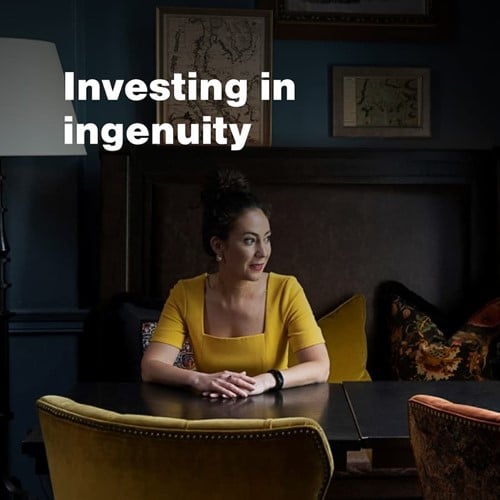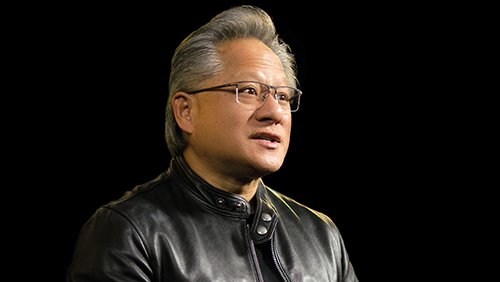
Please remember that the value of an investment can fall and you may not get back the amount invested.
When I started at Baillie Gifford back in 1973, it was an extremely conservative organisation. We were there to serve existing clients rather than to expand the business.
I was told that, years before, the company had been approached by Glaxo to manage its pension fund. Our firm told it to go on its way.
And when I suggested to the then senior partner that we travel to Glasgow to visit the newly established British National Oil Corporation, he looked over his half-moon spectacles and said: “My boy, we do not tout for business.”
But attitudes changed after we lost our second-largest client, the Edinburgh and Dundee Investment Trust, in 1977.

That misfortune, however, ultimately played to our long-term advantage as it led us to create a department focused on investments outside the US markets and the establishment of a strategy that’s now entering its fourth decade of success.
Client relationships
At first, there was no clear plan about how best to pursue new business. But we seemed to be most at ease with the idea of managing portfolios for clients based outside the UK. Maybe that was because we felt less inhibited in marketing ourselves to foreigners. They wouldn’t realise how demeaning it was to sell oneself!
We were given an introduction to a bank in Dallas and, over lunch there, a number of us slowly realised that we were being hired to run an international portfolio that they would market to retail customers.
It was interesting and great fun learning how to market international investments. You had to have a good story. You had to be aware of the end clients’ feelings and fears. To them, the idea of putting money in foreign companies beyond the Dow Jones’s 30 shares represented a big step.
What we offered was the fact that, while we were foreign, we spoke English. We looked fairly trustworthy. We had been doing this for a long time, that’s to say investing in foreign companies.
And we were Scottish. Not all of us were, but we were based in Scotland. We played upon this a great deal.
The argument went something like this: Scotland used to be a very successful industrial country. Glasgow had been the manufacturing heart of the empire. Then countries, including the United States, became successful competitors, and there was less demand for Scottish heavy machinery. So instead of profits being reinvested in Scotland, excess capital had to be recycled away from home to opportunities overseas.
Scottish connections
Scottish money went first to the English-speaking world – into farming, agriculture and railways in Canada, Australia, South Africa and the US. But it also went to other areas where Scottish expertise could succeed – plantations in Malaya, Africa and South America. And it was not just Scottish capital that was exported, but Scottish people.
I could produce long lists of successful Scots, and this was in the days before the internet. It was more a matter of looking at successful companies and then discovering which ones had a Scot at the bottom of them. For example, David Buick – the founder of the Buick Motor Company – was born in Arbroath. And I could point out that the second-highest percentage of millionaires in the United States were Scots, after Russians.

This was a very successful marketing story, and we flogged it hard. I should add that while the story proved to be very popular abroad, it was very unpopular with some of my colleagues in Edinburgh.
“You can’t say that!” one said. “People will think that only the stupidest Scots stayed at home.” I could see his point, but I ploughed on.
The retail money came in, and the performance was good. Soon we were building up an impressive track record from our investments in Japan, emerging markets and most importantly continental Europe.
More from the anthology:
James Anderson deserves much of the credit for this. He was one of the younger regional investors and had built an excellent enthusiastic team around himself. As many know now, he was not afraid to take risks or to stick his neck out, and his performance figures were excellent, built on both shrewd large-scale judgements and the identification of many small successful companies.
His mix of boldness and skill has served as an inspiration to others who have adopted and adapted the approach to make their own investment decisions.
Telling the truth
As I recall, our first institutional clients opted for European mandates. The Meyer Memorial Trust springs to mind. After that came Los Angeles City Employees, the City of Montreal, and others.
Of course, James’s non-index approach meant there were periods of volatility, and there came a time when our European numbers appeared to be weak. I looked after Montreal and had a good relationship with our contact there, Bertrand Goudreault. He always teased me for visiting in the winter without an overcoat or goloshes.
Anyway, there I was, sitting in the windowless waiting room in the City Hall, waiting and waiting to go into the meeting with the pension fund board. The room was dark. I was frightened.

About an hour behind schedule, I was hauled into the boardroom. You could smell the rage. I started my apologetic presentation, voice quivering. They took no notice. I ploughed on. I could have been reciting the Old Testament for all they cared. There were no questions.
Bertrand ushered me out. “Well done,” he said. “They weren’t interested in you, there’s just been a huge row between the representatives of the police and of the firemen.”
A week later, Bertrand rang me and said: “You’ve done so badly – pause – we’re doubling what you look after.”
So there was more to it than just performance: being humble, being interested in the client, telling the truth and keeping the boring administrative aspects of service completely perfect.
Our focus on long-term performance also helped reassure clients during periods of short-term volatility.
That wasn’t always the case though. The State of New York initially appointed us to invest in European holdings on its behalf and became a huge client. But the consultants it used as intermediaries let us go during a period of underperformance.
I had a contact who worked directly at the New York State Common Retirement Fund, however. And about a week after we had been fired, I sent her a spreadsheet of our international performance with no commentary at all. Just the numbers. I figured it couldn’t do any harm.
About two months later, before the state took away the European money, she called and said: “We’re going to give you an EAFE mandate instead.” This was a reference to a portfolio of stocks to be held in Europe, Australasia and the Middle East.
This was another example of the importance of building relationships. My contact went on to work for two or three other large public funds, and every one of them became a Baillie Gifford client.
I have always found communicating via third parties to be a challenge. Fortunately, we had people who were much more patient than I to answer their questions. And with the distance of time, I can appreciate the most important thing was to serve our clients’ needs.
Continual improvement
So why did we do so well? We were not the most advanced adherents to modern portfolio theory or portfolio construction methods, risk analysis and all the other bells and whistles that seemed to go down well.
It was because of the stability of our firm and the fact that we were our own masters. We had low personnel turnover and grew our own talent, allowing us to hone our skills and become better stock pickers over time. And we demonstrated that as active growth investors we could help our clients preserve and grow their capital by owning a more diversified portfolio, backed up by our ongoing research into which international companies were best positioned to outperform the market.

I retired in 2008, but take satisfaction in seeing the now renamed Baillie Gifford Developed EAFE All Cap Strategy reach its 30th anniversary. Despite some early scepticism, it has proven its worth both internally and more importantly to clients, consistently outperforming the benchmark MSCI EAFE Index.
So long as its managers maintain their willingness to continually improve how they invest for the long term, and its clients team communicates in a clear and honest manner, the Strategy and its younger international siblings – under the banners of International Growth, International All Cap, International Alpha and International Concentrated Growth – should have many further anniversaries to celebrate.
Read more from the anthology:
Risk Factors
The views expressed should not be considered as advice or a recommendation to buy, sell or hold a particular investment. They reflect opinion and should not be taken as statements of fact nor should any reliance be placed on them when making investment decisions.
This communication was produced and approved in September 2022 and has not been updated subsequently. It represents views held at the time of writing and may not reflect current thinking.
Potential for Profit and Loss
All investment strategies have the potential for profit and loss, your or your clients’ capital may be at risk. Past performance is not a guide to future returns.
Stock Examples
Any stock examples and images used in this communication are not intended to represent recommendations to buy or sell, neither is it implied that they will prove profitable in the future. It is not known whether they will feature in any future portfolio produced by us. Any individual examples will represent only a small part of the overall portfolio and are inserted purely to help illustrate our investment style.
This communication contains information on investments which does not constitute independent research. Accordingly, it is not subject to the protections afforded to independent research, but is classified as advertising under Art 68 of the Financial Services Act (‘FinSA’) and Baillie Gifford and its staff may have dealt in the investments concerned.
All information is sourced from Baillie Gifford & Co and is current unless otherwise stated.
The images used in this communication are for illustrative purposes only.
|
2018 |
2019 |
2020 |
2021 |
2022 |
|
|
Developed EAFE All Cap Composite |
9.3 |
0.5 |
9.0 |
36.8 |
-35.0 |
|
MSCI EAFE Index |
7.4 |
1.6 |
-4.7 |
32.9 |
-17.3 |
|
1 Year |
5 Years |
10 Years |
|
|
Developed EAFE All Cap Composite |
-35.0 |
1.3 |
5.6 |
|
MSCI EAFE Index |
-17.3 |
2.7 |
5.9 |
Source: Baillie Gifford & Co and underlying index provider(s). USD.
Source: MSCI. MSCI makes no express or implied warranties or representations and shall have no liability whatsoever with respect to any MSCI data contained herein. The MSCI data may not be further redistributed or used as a basis for other indexes or any securities or financial products. This report is not approved, endorsed, reviewed or produced by MSCI. None of the MSCI data is intended to constitute investment advice or a recommendation to make (or refrain from making) any kind of investment decision and may not be relied on as such.
Past performance is not a guide to future results.
Important information
Baillie Gifford & Co and Baillie Gifford & Co Limited are authorised and regulated by the Financial Conduct Authority (FCA). Baillie Gifford & Co Limited is an Authorised Corporate Director of OEICs.
Baillie Gifford Overseas Limited provides investment management and advisory services to non-UK Professional/Institutional clients only. Baillie Gifford Overseas Limited is wholly owned by Baillie Gifford & Co. Baillie Gifford & Co and Baillie Gifford Overseas Limited are authorised and regulated by the FCA in the UK.
Persons resident or domiciled outside the UK should consult with their professional advisers as to whether they require any governmental or other consents in order to enable them to invest, and with their tax advisers for advice relevant to their own particular circumstances.
Financial intermediaries
This communication is suitable for use of financial intermediaries. Financial intermediaries are solely responsible for any further distribution and Baillie Gifford takes no responsibility for the reliance on this document by any other person who did not receive this document directly from Baillie Gifford.
Europe
Baillie Gifford Investment Management (Europe) Limited provides investment management and advisory services to European (excluding UK) clients. It was incorporated in Ireland in May 2018. Baillie Gifford Investment Management (Europe) Limited is authorised by the Central Bank of Ireland as an AIFM under the AIFM Regulations and as a UCITS management company under the UCITS Regulation. Baillie Gifford Investment Management (Europe) Limited is also authorised in accordance with Regulation 7 of the AIFM Regulations, to provide management of portfolios of investments, including Individual Portfolio Management (`IPM') and Non-Core Services. Baillie Gifford Investment Management (Europe) Limited has been appointed as UCITS management company to the following UCITS umbrella company; Baillie Gifford Worldwide Funds plc. Through passporting it has established Baillie Gifford Investment Management (Europe) Limited (Frankfurt Branch) to market its investment management and advisory services and distribute Baillie Gifford Worldwide Funds plc in Germany. Similarly, it has established Baillie Gifford Investment Management (Europe) Limited (Amsterdam Branch) to market its investment management and advisory services and distribute Baillie Gifford Worldwide Funds plc in The Netherlands. Baillie Gifford Investment Management (Europe) Limited also has a representative office in Zurich, Switzerland pursuant to Art. 58 of the Federal Act on Financial Institutions (“FinIA”). The representative office is authorised by the Swiss Financial Market Supervisory Authority (FINMA). The representative office does not constitute a branch and therefore does not have authority to commit Baillie Gifford Investment Management (Europe) Limited. Baillie Gifford Investment Management (Europe) Limited is a wholly owned subsidiary of Baillie Gifford Overseas Limited, which is wholly owned by Baillie Gifford & Co. Baillie Gifford Overseas Limited and Baillie Gifford & Co are authorised and regulated in the UK by the Financial Conduct Authority.
South Korea
Baillie Gifford Overseas Limited is licensed with the Financial Services Commission in South Korea as a cross border Discretionary Investment Manager and Non-discretionary Investment Adviser.
Japan
Mitsubishi UFJ Baillie Gifford Asset Management Limited (‘MUBGAM’) is a joint venture company between Mitsubishi UFJ Trust & Banking Corporation and Baillie Gifford Overseas Limited. MUBGAM is authorised and regulated by the Financial Conduct Authority.
Australia
Baillie Gifford Overseas Limited (ARBN 118 567 178) is registered as a foreign company under the Corporations Act 2001 (Cth) and holds Foreign Australian Financial Services Licence No 528911. This material is provided to you on the basis that you are a ‘wholesale client’ within the meaning of section 761G of the Corporations Act 2001 (Cth) (‘Corporations Act’). Please advise Baillie Gifford Overseas Limited immediately if you are not a wholesale client. In no circumstances may this material be made available to a ‘retail client’ within the meaning of section 761G of the Corporations Act.
This material contains general information only. It does not take into account any person’s objectives, financial situation or needs.
South Africa
Baillie Gifford Overseas Limited is registered as a Foreign Financial Services Provider with the Financial Sector Conduct Authority in South Africa.
North America
Baillie Gifford International LLC is wholly owned by Baillie Gifford Overseas Limited; it was formed in Delaware in 2005 and is registered with the SEC. It is the legal entity through which Baillie Gifford Overseas Limited provides client service and marketing functions in North America. Baillie Gifford Overseas Limited is registered with the SEC in the United States of America.
The Manager is not resident in Canada, its head office and principal place of business is in Edinburgh, Scotland. Baillie Gifford Overseas Limited is regulated in Canada as a portfolio manager and exempt market dealer with the Ontario Securities Commission (‘OSC’). Its portfolio manager licence is currently passported into Alberta, Quebec, Saskatchewan, Manitoba and Newfoundland & Labrador whereas the exempt market dealer licence is passported across all Canadian provinces and territories. Baillie Gifford International LLC is regulated by the OSC as an exempt market and its licence is passported across all Canadian provinces and territories. Baillie Gifford Investment Management (Europe) Limited (‘BGE’) relies on the International Investment Fund Manager Exemption in the provinces of Ontario and Quebec.
Israel
Baillie Gifford Overseas is not licensed under Israel’s Regulation of Investment Advising, Investment Marketing and Portfolio Management Law, 5755–1995 (the Advice Law) and does not carry insurance pursuant to the Advice Law. This material is only intended for those categories of Israeli residents who are qualified clients listed on the First Addendum to the Advice Law.
23405 10009658








